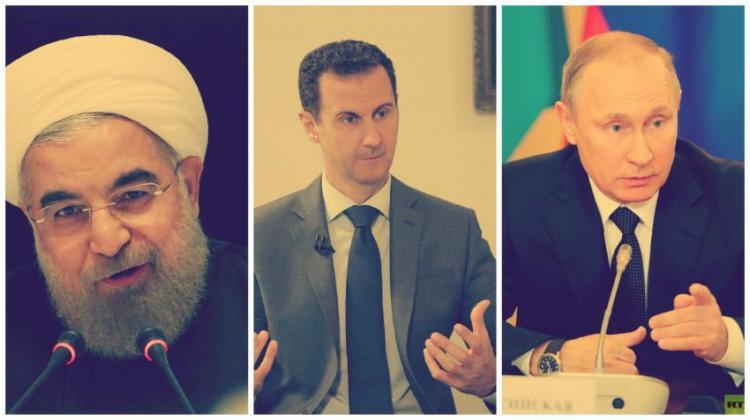Moscow – North-Press Agency
Fahim Al-Sorani
Various media outlets have been recently busy focusing on the assumption that there are negotiations between Moscow and Tehran over approaching the political settlement of the crisis in Syria, the tactical and strategic forms of armed engagement with the oppositional armed groups, which in turn relate to several regional states.
Speculations exceeded the limits of talking about the negotiations, as it raised the issue of the Iranian presence, to the assumption of a Russian desire to end the Iranian military presence in Syria.
Propaganda War
As for the negotiations between Russia and Iran, if they exist, and their impact on the cooperation of the two countries in confronting the externally supported armed groups in Syria, in addition to what Moscow feels about the Iranian presence in Syria, Russian expert on the military affairs Boris Rogin said: “Talks about a Russian- Iranian negotiations in Syria as part of a propaganda campaign involving mainly the United States and Israel, through several websites, some of which are related to the Iranian opposition abroad.”
“This brings back to mind what the Pentagon’s research centers have expressed, that the interests of Washington and Tel Aviv require the dismantling of the Russian-Iranian cooperation, which foiled the US strategy of toppling President Bashar al-Assad.”
He explains that in the context of the American-Israeli “thirst” to achieve this goal, this kind of psychological warfare and misleading propaganda campaigns will continue, and some of the existing differences between the two countries will be amplified objectively in the Syrian file, but “has no strategic implications for the future of bilateral relations, and joint action between the two countries, which exceeds the limits of the Syrian crisis.”
Asharq Al-Awsat newspaper said in a recent report that Iran is facing special military, political and economic pressures in areas controlled by the Syrian government, with Russian support.
Where Moscow supported the Hmeimim base and formed the Fifth Corps, which includes about 50,000 troops, the corps consists of Syrian members loyal to the Syrian government, in addition to some former opposition armed militias, such as “Free Army”, and “South Front”.
Members of the Fifth Corps were deployed southern Syria, after the withdrawal of Iranian forces at the beginning of last year under a “Russian-American-Israeli” understanding, while Moscow wants those corps members to counter Tehran’s attempt to recruit Syrian young men in southern Syria, or in the east of the Euphrates.
Despite that Russia, Iran and Turkey are the sponsors of the Astana peace process, that aimed at ending the conflict in Syria, in which the agreement of the de-escalation zones was born between Ankara and Moscow last September, where the three countries deployed observation points in the “North Triangle,” which includes the governorate of Idlib and parts of Hama, Latakia and Aleppo countryside, however, Moscow has asked hundreds of “Fifth Corps” members to head to northwest Syria, to support the battles of Idlib.
Economically
Russia continues to compete economically with Iran to acquire major projects in the region, after obtaining a contract to operate port of Tartous near the expanded Tartous military base in response to Tehran’s decision to manage the port of Latakia, Russia is considering investing in Damascus International Airport, close to the former headquarters of the Iranian forces in Syria, which was moved earlier to northern Syria, because of the Israeli airstrikes.
Boris Dolgov, a senior researcher at the Center of Arab and Islamic Studies of the Institute of Oriental Studies in Moscow, told North-Press that the approach of the Israeli factor in the Syrian conflict is the core of the differences between the two allies, Russia and Iran.
Strategic Patience
Dolgov clarifies that Iran has always raised with the Russian officials the subject of “Aggressive behavior” of Israel in Syria, especially since the Israeli fighter-jets directly hit Iranian military positions, and other allied forces, as well as targeting the Syrian government forces, while Moscow prefers a policy of patience and not turning Syria into an Iranian-Israeli settling arena, and “withdrawing” any confrontation that could bring the crisis back to “square one”.
In this context, he points out to the differences between the two countries in terms of their willingness to talk to regional actors, especially Turkey, Israel, Saudi Arabia, and Qatar, where Moscow has a wider space in this framework for subjective and objective reasons.
Nevertheless, Dolgov stresses that what brings Moscow and Tehran together is more than what divides them, the danger posed by the armed groups in Syria, and the “adventures” of regional and international opponents, who continue to support these groups, requires careful coordination between Moscow and Tehran, and it is in full swing, as he expressed.
The Russian researcher concluded that the common nature of these threats is precisely what led to the formation of the alliance between Russia and Iran, which will continue until the settlement of the Syrian crisis!

